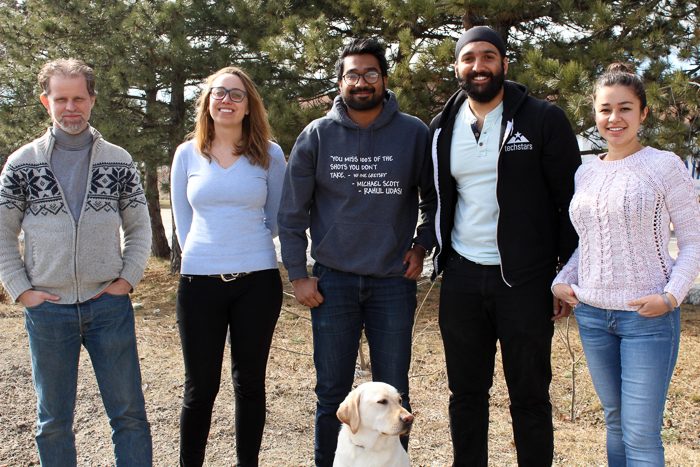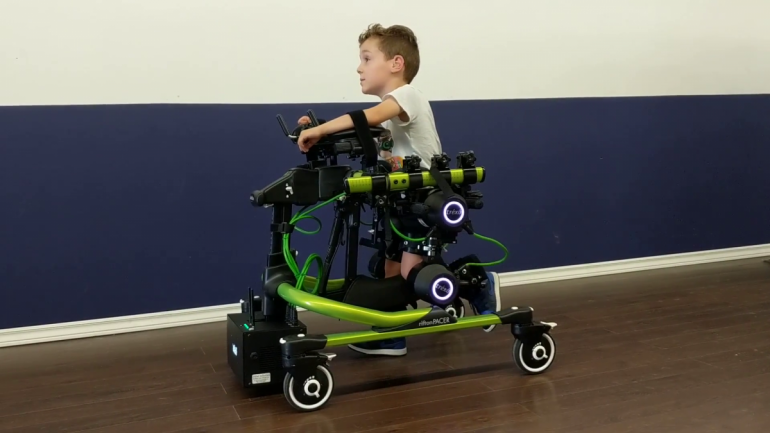Trexo Robotics, a company which aims to redefine mobility solutions for people of all ages and abilities, was recently featured as one of the Canadian startups at Y Combinator’s 2019 Demo Day. The company, which participated in the accelerator as part of its winter cohort, is building one of the first wearable robotic devices designed to allow children with disabilities to walk.
“My nephew walking for the first time was the proudest moment of my life.”
Trexo’s solutions consists of a pair of robotic legs, also called an exoskeleton, that can connect to a child’s legs, allowing them to stand and walk. Trexo is built around an external walker frame, which is typically something a child with a disability already has at home.
The children’s market is generally untapped for robotic exoskeletons, one that the company estimates to be worth about $6 billion. Trexo is looking to become one of the first commercial exoskeleton manufacturers to truly disrupt this younger market. While many exoskeleton companies have struggled with factors like price and regulation, Trexo said it has managed to reduce those barriers of entry through its intellectual property and market strategy.
Trexo Robotics was founded by Manmeet Maggu and Rahul Udasi, two mechatronics engineering graduates from the University of Waterloo. In 2011, Maggu learned that his nephew, Praneit, was diagnosed with cerebral palsy, a debilitating mobility disorder that would not allow Praneit to walk. Maggu’s family searched for solutions, only to find that most existing exoskeletons were being designed for adults.

Fast forward to 2016, when Maggu was attending the University of Toronto’s Rotman School of Management and Udasi was working on his Masters of Engineering. Rather than pursuing a summer internship, a standard move for most grads, Maggu and Udasi decided to take a shot at Trexo.
“Seeing my nephew walking for the first time was definitely the proudest moment of my life,” Maggu said.
He noted that being with Y Combinator is now allowing the company to access mentorship opportunities and achieve one of its biggest milestones – to make the device available for families to reserve and preorder.
“Y Combinator allowed us to accelerate a lot of the development and have our first devices deployed,” Maggu said. “The mentorship was extremely valuable.”
Apart from Y Combinator, Trexo has also participated in Techstars’ accelerator program in New York and raised $720,000 in seed funding. Trexo Robotics was also awarded $35,000 from Sunnybrook Hospital Next Generation’ Hawk’s Nest, a healthtech-focused pitch competition.
RELATED: Reshaping healthcare with robotics
After progressing through the Techstars accelerator and raising a $720,000 USD seed round, Trexo was able to place its exoskeletons in private homes and hospitals, where clinical trials are currently being conducted. The company’s products have been approved for the US and Canada by the FDA and Health Canada.
While participating in Y Combinator Trexo was able to launch and is accepting pre-orders for its exoskeletons. A version of its product is currently being sold in Canada. Trexo is using a direct-to-consumer approach that would see its product selling for $899 USD per month through a lease model. In its Demo Day pitch, Maggu said in the last three months it has booked $38,000 in monthly recurring revenue from preorders.
“We’re really excited by the demand that we’re seeing, from not just families, but from top hospitals,” he said.
The company currently has five full-time staff, and three interns, but Maggu said the team is expected to expand this year. He sees opportunities for Trexo to begin developing products for elder care as well and eventually all humans, for now, the products are only available for children.
“We think robotics can have a big impact on the future of humanity to come, and lack of mobility is something that anyone could face,” he said. “As we are growing our team, we are looking for people that have the passion to solve the hardest problems in the world make them a reality.”
Image courtesy Trexo Robotics.


